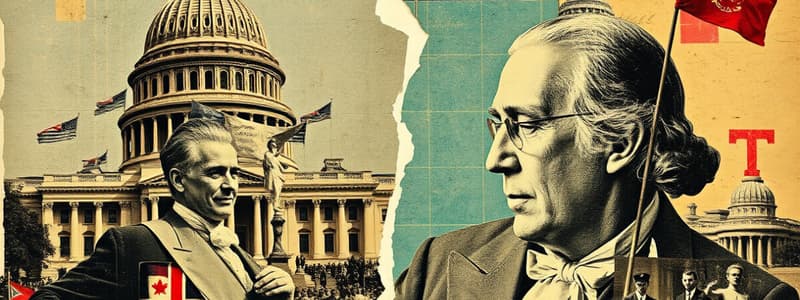Podcast
Questions and Answers
What is the main difference between a republic and a democracy?
What is the main difference between a republic and a democracy?
- A republic has a charter or constitution that limits power. (correct)
- A republic allows for majority rule.
- A democracy is a representative government.
- A democracy has a charter or constitution that limits power.
What is the federal system of government?
What is the federal system of government?
A system where power is shared by a powerful central government and states or provinces.
Match the following forms of government with their descriptions:
Match the following forms of government with their descriptions:
Federal System = Power is shared between central and state governments. Unitary System = One central government controls weaker states. Confederal System = Weak organization of states follows a strong central government.
What is the difference between a presidential and a parliamentary form of government?
What is the difference between a presidential and a parliamentary form of government?
Define Social Contract Theory.
Define Social Contract Theory.
Flashcards are hidden until you start studying
Study Notes
Difference Between a Republic and a Democracy
- A republic is a representative government limited by a constitution protecting individual rights, while a democracy is ruled by the majority's will.
- In a democratic system, the majority can act without restrictions, potentially infringing on minority rights.
- A true democracy operates under the principle of majority rule, prioritizing collective will over individual protections.
- In contrast, a republic safeguards against majority tyranny by ensuring representation and rights for minorities.
Federal, Unitary, and Confederation Styles of Government
- Federal System: Power is divided between a strong central government and states or provinces, allowing for self-rule (e.g., United States, Australia).
- Unitary System: Central government holds all power, with weaker states having little autonomy (e.g., China, United Kingdom).
- Confederal System: Loose alliance of states that can choose to follow a central government with limited authority (e.g., Commonwealth of Independent States, Confederate States of America).
- Key distinctions:
- Unitary systems centralize political authority.
- Confederations grant nearly all power to individual states.
Presidential vs. Parliamentary Government
- In a presidential system, the president operates independently of the legislative body, allowing for checks and balances between branches.
- In a parliamentary system, the chief executive (prime minister) is a member of the legislature, making it directly accountable to the legislative body.
- Elections differ: in a presidential system, the president and legislature are elected separately; in a parliamentary system, the legislature elects the prime minister from its members.
- Legislative enactment varies:
- Presidential systems face potential legislative gridlock if the president's views conflict with the legislature.
- Parliamentary systems allow for swift legislative action, and a prime minister can be removed by a vote of no confidence.
Social Contract Theory
- Concepts of governance emerge from mutual agreements to form society, balancing individual rights and collective responsibilities.
- Philosophical roots suggest legitimacy of authority derives from the consent of the governed.
Studying That Suits You
Use AI to generate personalized quizzes and flashcards to suit your learning preferences.




